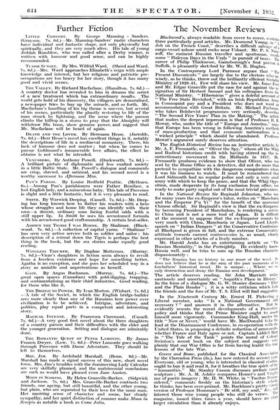The November Reviews Blackwood's, always readable from cover to cover,
contains three particularly good articles. Mr. Desmond Young, in A
Job on the French Coast," describes a difficult salvage of a
cargo-vessel ashore amid rocks -near Ushant: Mr. P. S. N. roff, the eminent Russian traveller and sportsman, renal some "Halcyon Days in the Urals" in pursuit of bears. The career of Philip Thicknesse, Gainsborough's first patron in Suffolk, is pleasantly sketched by Mr. W. R. Hughes.
In. the Contemporary Lord Parmoor argues that "Ti, Present Discontents" are largely due to the electors who un- wisely, as he thinks, threw out the brilliantly efficient Socialist Ministry_of 1929-31. Few will share his view. Mr. Isaac Foot and Mr. Edgar Granville put the case for and against the re. signation of Sir Herbert Samuel and his colleagues from the National Ministry. " Hibernietts " gives a doleful account of "The Free_ State Revisited," with an Irish Republican Army in Communist pay and a President who does not want an accommodation with Great Britain. Mr: Michael Farbman, who takes -Bolshevist programmes very seriously, describes "The Second Five Years' Plan in the Making." The article that makes the deepest impression is that of Professor R. B, Mowat, who, under the title of" Europe and America," urges that Europe has been wrong in following America's methods of mass-production and that economic nationalism is a "wicked principle" which should be abandoned. Professor Mowat's argument surely deserves attention. • The English Historical Review has an instructive article, he Mr. A. F. Fremantle, on" Oliver the Spy," whom all the Whig and Radical historians credit with having stirred up the in. surrectionary movement in the Midlands in 1817. Mr, Fremantle produces evidence to shOw that Oliver, who was sent by the Home Office as a detective, did not do more than pretend to sympathize with the dangerous conspirators whom it was his business- to _watch. It must be remembered that Lord Sidinotith had no regular police and only a very small army with-which to keep the peace, and that the Whig. Opp°. sition, made desperate by its long exclusion from office, was ready to make party _capital out of the most trivial grievances.
In the National Review Sir Reginald Johnston, who was for many years the ex-Emperor's tutor, writes on "Manchuria and the Emperor P'u Yi for the benefit of the marooned Chinese official. Sir Reginald's view is that the ex-Emperor, by becoming President of Manchukuo, is rendering a service to China and is not a mere tool of Japan. It is difficult at- the moment to suppose that the ex-Emperor counts for very much with China, Manchuria or Japan. Lord Lloyd's speech on "Indian Dangers " at the Conservative-Conference at- Blackpool is given in. full, and the extreme Conservative attitude towards current controversies is, as usual, clearly expressed in other articles of a lively number. - Mr. Harold Jenks has an entertaining article- "The Russian Mentality," in the Fortnightly. 'He evidenly knows Russia well, and he tries to sum up the Russian character
dispassionately : •
"The Russian has no history in one sense of the word. He does not believe that he is the sum of the past moments of In forefathers' historical trend. He is unique. . . Where we see only destruction and decay -the Russian sees development." The article deserves reading. Sir John Marriott writes cautiously and uncertainly on " Asquith's Place in History: In- the form of a dialogue Mr. G. W. -Stonier discusses "Eliot , and the Plain -Reader"; ; it is a witty criticism which both the friends and the foes of Mr. T. S. Eliot will find suggestive.] In the Nineteenth Century Mr. Ernest H. Pickering. a Liberal member, asks "Is a National Government still necessary ? "- and answers it in the affirmative. But he evidently resents the recent developments of a Protective policy and thinks that the Prime Minister might to asset himself more vigorously. Commander King-Hall, under the title "Now or Never," would have Mr. MacDonald take the lead at the Disarmament Conference, in co-operation with the United States, in proposing a definite reduction of armaments, whether France and Italy agree or not. Captain Liddell Hart in "The Tale of the Tank" points the moral of Colonel Swinton's recent book on the subject and suggests very plainly that our War Office is far from having learnt the true lessons of the late War.
Greece and Rome, published for the Classical A.ssociation by the Clarendon Press (3s.), has now entered its second year Everyone, old or young, who is interested in classical stuilirs ought to buy it and read it, for it breathes the true spirit of tb' " humanities." Mr. Stanley Casson discusses archaic c;ffel` sculpture ; Mr. A. M. Ashley compares Homer's and Virgil's use of poetic imagery ; Mr. H. W. White, in " Tacitus lie °U sidered " comments freshly on the historian's style which. he thinks, has been over-praised. Mr. Rackham's pretty Gni version of Professor .Housman's ." Be still, my. soul,' interest those wise young people who still do verses. 1,1: magazine, issued three times a year, should have an eV larger circulation than it already enjoys.










































 Previous page
Previous page